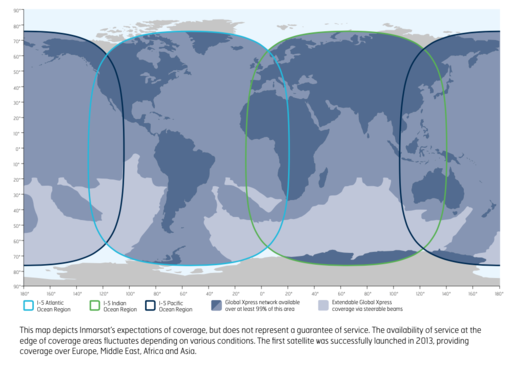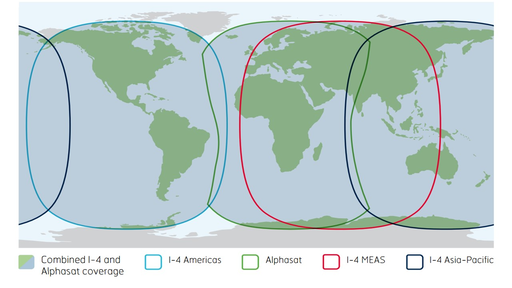Fleet Xpress¶
Provider details at:
- https://marlink.com/products/fleet-xpress/
- https://www.inmarsat.com/service/fleet-xpress/
- https://www.inmarsat.com/service/fleetbroadband/
- https://www.inmarsat.com/service/global-xpress/
Fleet Xpress is a product offered by Inmarsat. Fleet Xpress is a system of systems made up of one or more Global Xpress system(s) (primary) and one FleetBroadband (backup) that are configured to cooperate. Global Xpress offers more performance capability, but weather can be a factor, making FleetBroadband useful for some amount of failover when Global Xpress is offline.
Generally, we use Fleet Xpress on all vessels.
- For vessels with over 40 berths, it is an excellent secondary system
- For smaller vessels, it is useful as primary system that is a good balance of performance capability and small above-decks equipment footprint
Global Xpress¶
Global Xpress is the primary system of Fleet Xpress.
Global Xpress’s higher frequency (IEEE Ka-band) means better throughput, but also means that it is impacted by cloud cover more easily.
Bandwidth¶
Inmarsat offers tiers of performance at pre-negotiated rates for the Global Xpress component of Fleet Xpress.
All Committed Information Rate (CIR) and Maximum Information Rate (MIR) units are in Kilobits Per Second (kbps).
When planning, one should plan for the CIR. MIR throughput typically only happens over a few seconds and should generally not be expected to last for very long.
Since most people tend to think in terms of MegaBytes, note that one MegaByte is 8192 kilobits.
| CIR shore-to-ship | CIR ship-to-shore | MIR shore-to-ship | MIR ship-to-shore | Notes |
|---|---|---|---|---|
| 512 | 256 | 4096 | 2048 | Nominal plan for vessels with less than 40 berths (Q1 2020 to ~Q1 2022). |
| 512 | 512 | 8192 | 4096 | — |
| 1024 | 512 | 8192 | 4096 | Nominal plan for vessels with 40 berths or more (Q1 2020 to ~Q1 2022). |
| 1024 | 1024 | 8192 | 4096 | — |
| 2048 | 1024 | 8192 | 4096 | — |
| 2048 | 2048 | 8192 | 4096 | Nominal plan for ARF vessels (beginning Q4 2021-Q1 2022) |
| 3072 | 1536 | 8192 | 4096 | Subject to capacity approval. 90 days advanced planning recommended. |
| 3072 | 1536 | 8192 | 4096 | Subject to capacity approval. 90 days advanced planning recommended. |
| 3072 | 3072 | 8192 | 4096 | Subject to capacity approval. 90 days advanced planning recommended. |
| 4096 | 2048 | 8192 | 4096 | Subject to capacity approval. 90 days advanced planning recommended. |
| 4096 | 4096 | 8192 | 4096 | 10 W BUC required. Subject to capacity approval. 90 days advanced planning recommended. |
| 6144 | 3072 | 8192 | 4096 | Subject to capacity approval. 90 days advanced planning recommended. |
| 5120 | 5120 | 8192 | 5120 | 10 W BUC required. Subject to capacity approval. 90 days advanced planning recommended. |
| 8192 | 4096 | 8192 | 4096 | 10 W BUC required. Subject to capacity approval. 90 days advanced planning recommended. |
| 10240 | 5210 | 10240 | 5120 | 10 W BUC required. Subject to capacity approval. 90 days advanced planning recommended. |
Frequencies¶
Global Xpress uses IEEE Ka-band frequency range.
Coverage Maps¶

FleetBroadband¶
FleetBroadband is the backup system of Fleet Xpress.
FleetBroadband’s lower frequency (IEEE L-band) means that it is the least affected by cloud cover. The larger wavelength, coupled with its small antenna mean that its throughput is limited, however. FleetBroadband is generally not a functional backup for an entire ship with a berthing count above 40.
Bandwidth¶
All Committed Information Rate (CIR) and Maximum Information Rate (MIR) units are in Kilobits Per Second (kbps).
When planning, one should plan for the CIR. MIR throughput typically only happens over a few seconds and should generally not be expected to last for very long.
Since most people tend to think in terms of MegaBytes, note that one MegaByte is 8192 kilobits.
| CIR shore-to-ship | CIR ship-to-shore | MIR shore-to-ship | MIR ship-to-shore | Notes |
|---|---|---|---|---|
| best effort | best effort | 432 | 432 | — |
Frequencies¶
FleetBroadband uses IEEE L-band frequency range.
Coverage Maps¶

Suspensions¶
Note
Satellite-based Internet is very expensive, so suspending plans when feasible can greatly reduce overall operating costs. Reducing those costs mean less expenditure to our funding agencies and less overall expense in ships’ day rate(s).
We encourage all participants to contact us when/if you are aware that your ship will be laid up for an extended period of time and a terrestrial network connection is available.
Suspension duration should typically be for at least 1 month. A start date and end date is needed to make the request, and this can be adjusted if need be. Typical request processing can take a full business week to request or change.
It is possible to suspend this plan. Our contract allows for up to 50% of the year in suspended mode.
Voice¶
Note
Sealink VoIP phones cost the least to use, on average. Please prefer this phone over others.
Specifically, Sealink phones are cheaper when calling: Alaska, Algeria, Andorra, Argentina, Australia, Austria, Bahrain, Bangladesh, Belgium, Bermuda, Bolivia, Brazil, Brunei, Bulgaria, Burundi, Cambodia, Canada, Chile, China, Colombia, Costa, Rica, Croatia, Cyprus, Czech, Rep, Denmark, Dominican, Rep, Estonia, Faroe, Finland, France, Germany, Gibraltar, Greece, Guadeloupe, Guam, Guiana, French, Hawaii, Hong, Kong, Hungary, Iceland, India, Indonesia, Iran, Iraq, Ireland, Israel, Italy, Jamaica, Japan, Jersey, Kazakhstan, Kenya, Korea, South, Laos, Latvia, Lithuania, Luxemburg, Macau, Malaysia, Malta, Martinique, Mexico, Monaco, Mongolia, Morocco, Mozambique, Namibia, Netherlands, New, Zealand, Nigeria, Norway, Pakistan, Panama, Paraguay, Peru, Poland, Portugal, Puerto, Rico, Reunion, Romania, Russia, Saipan, Samoa (American), Singapore, Slovakia, Slovenia, South, Africa, Spain, Swaziland, Sweden, Switzerland, Taiwan, Thailand, Turkey, United, Kingdom, Uruguay, USA, Uzbekistan, Venezuela, Vietnam, Virgin isl, US, or Zambia
Fleet Xpress VoIP phones can be double cost to use compared to Sealink VoIP, but have the advantage of being available via Global Xpress or FleetBroadband. Fleet Xpress is also available on all ships we support, whereas Sealink may not be.
The phone(s) plugged into the FleetBroadband unit are the most expensive to use.
Fleet Xpress comes with a couple VoIP voice lines. Ship use of ~100 hours per month is expected to be covered by our project. Heavier use may need to be evaluated on a case-by-case basis. The VoIP phones attached to the Xchange Power are substantially less expensive to use than the phone directly attached to the FleetBroadband below decks unit. Operators are advised to prefer the VoIP phones. The VoIP phones also have the added benefit that they work when Global Xpress or FleetBroadband are up, not just one system like the FleetBroadband phone.
